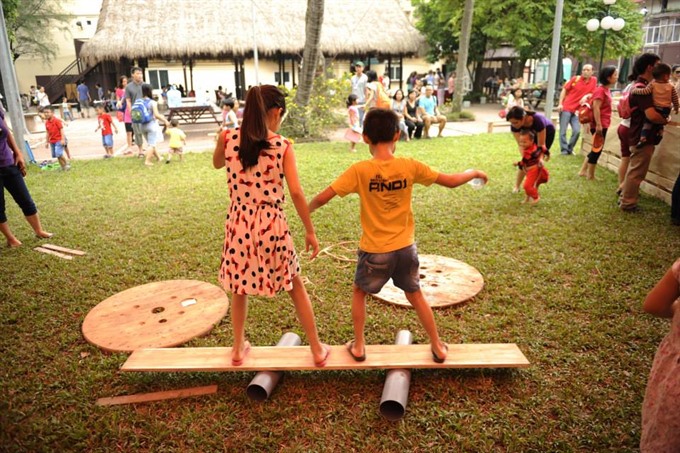 Life & Style
Life & Style

Children can experiment with rubber tires, wooden pallets, water pipes and other loose parts on July 22 on pedestrian-only Lê Thái Tổ Street by Hoàn Kiếm Lake, as part of an event that aims to foster appreciation for play among kids and parents alike.
 |
| Play time: Children will have an opportunity to play with recycled loose-parts materials like rubber tires, wooden pallets and water pipes contributed from the community. — Photo courtesy of Think Playgrounds group |
HÀ NỘI — Children can experiment with rubber tires, wooden pallets, water pipes and other loose parts on July 22 on pedestrian-only Lê Thái Tổ Street by Hoàn Kiếm Lake, as part of an event that aims to foster appreciation for play among kids and parents alike.
Children will be provided with tools and materials to become little woodworkers. They will also interact with familiar objects from daily life, as the organiser aims to help children gain the fundamental skills to become visual artists in the future. The event will introduce Think Playgrounds, a new non-traditional play space.
“By having loose parts accessible in your play space, children are encouraged to choose their own resources which provides a wider range of opportunities and allows for more open-ended play than adult-led activities,” said Nguyễn Tiêu Quốc Đạt, co-founder of Think Playgrounds.
“Playing with natural materials will encourage creativity and imagination more than playing with designed equipment. In addition, Loose Part Play is a good opportunity for community cohesion because children will have a great opportunity to make friends and together explore new functions of objects.”
Loose parts are materials that have no specific set of directions. They can be taken apart, put back together, carried, combined, lined up, moved and used alone or combined with other materials.
They can be natural objects such as stones, flowers, twigs, shells, pine cones, logs, flowers and seeds or synthetic items such as balls, ropes, buckets, pots, fabric and boxes. The theory of loose parts was developed by architect Simon Nicholson in the 1970s. He believed that loose parts in our environment allow for more creativity and engagement compared to static ones. His theory has now been accepted by childcare experts.
Think Playgrounds is a social enterprise with the mission of creating public spaces for children in Việt Nam.
It will join hands with the Goethe Institute, German-Franco Cultural Fund and L’Espace to organise a seminar entitled “What do children learn when they play”.
Professionals from France, Germany and Việt Nam will share their insights and experiences about the importance of playing in education. They will bring along hands-on experiences, and exciting new ideas which related to theories of educational culture for children.
More importantly, through this dialogue, participants who care about the development of children will have a great chance to discuss and share their opinions on how to help children build lives of fulfillment and happiness, and enjoy the pursuit of knowledge without needing to win external achievements. At a free space like a playground, children can learn many skills not included in their school curriculum.
“Playing conveys happiness to all children, however not all parents like to watch their children play outdoors. But there are valuable insights to be acknowledged,” said Đạt.
The seminar will take place on July 21 at the Goethe Institute, 56-58 Nguyễn Thái Học Street, Hà Nội. — VNS




